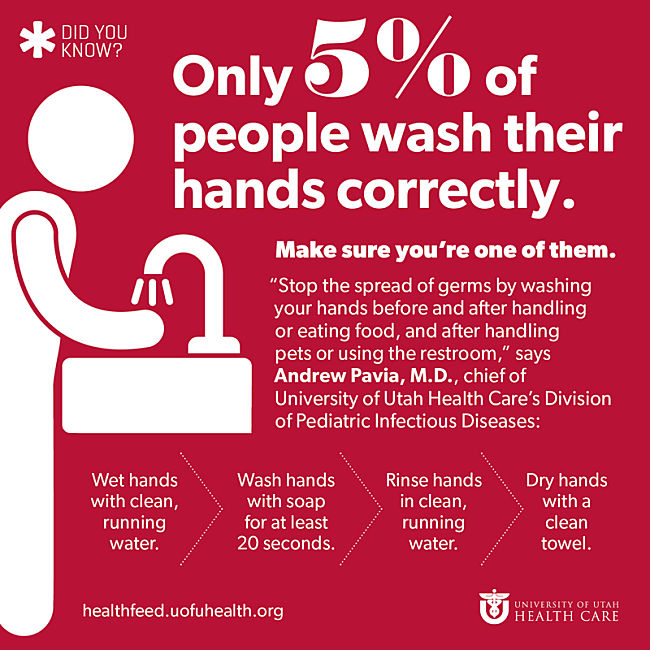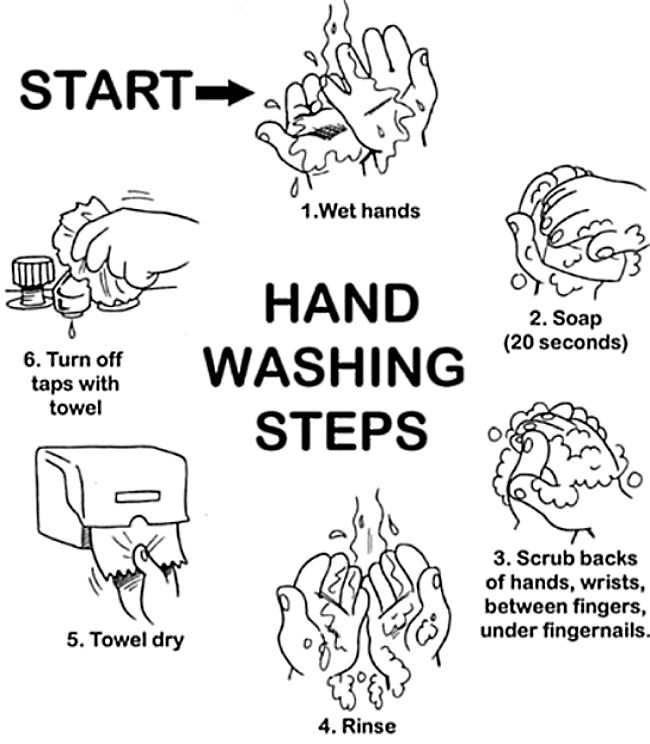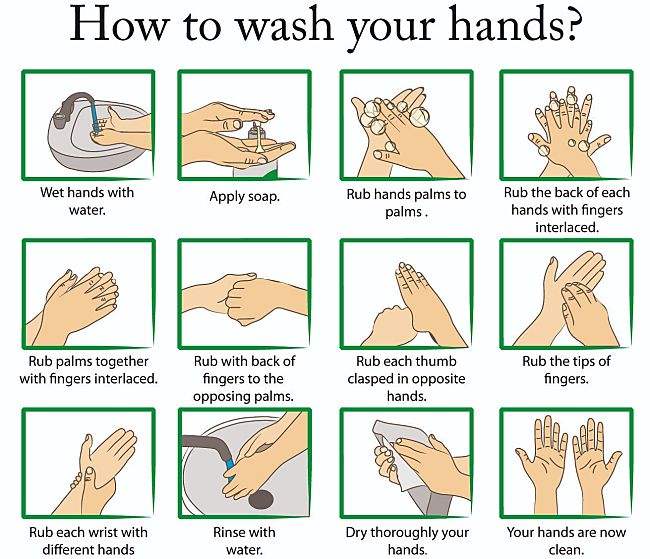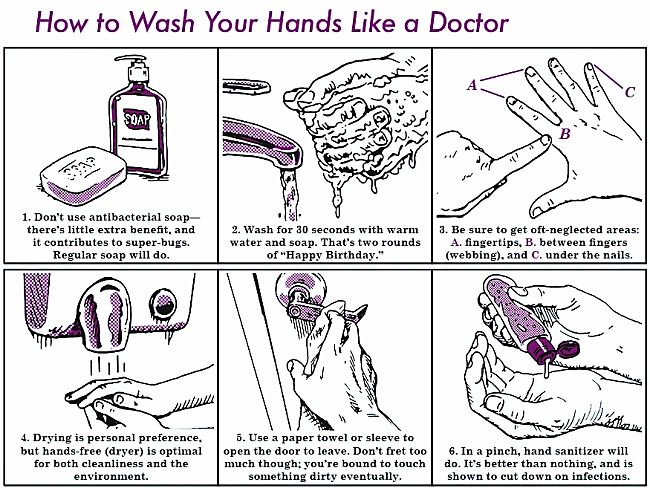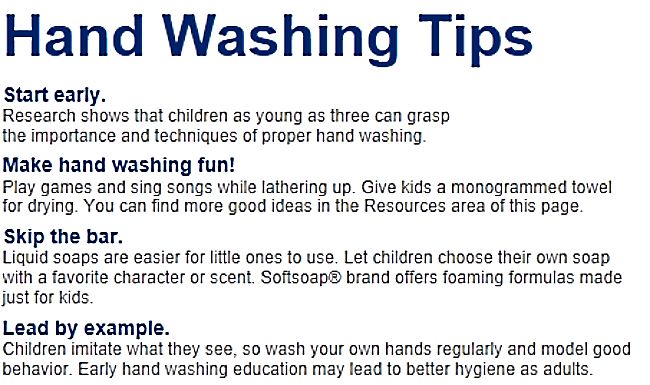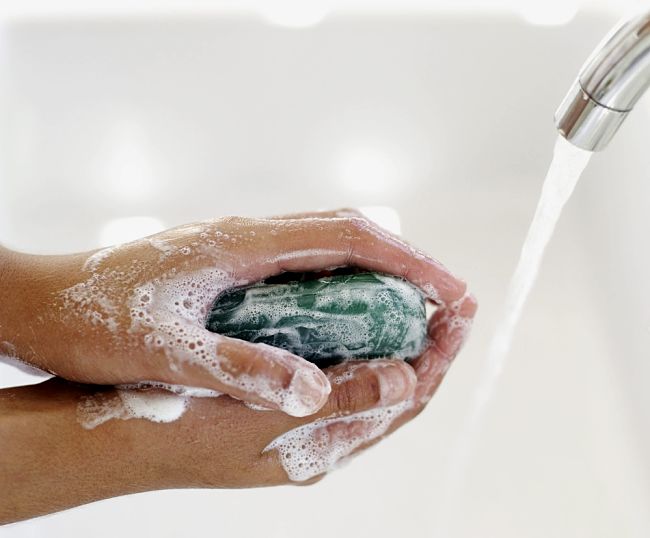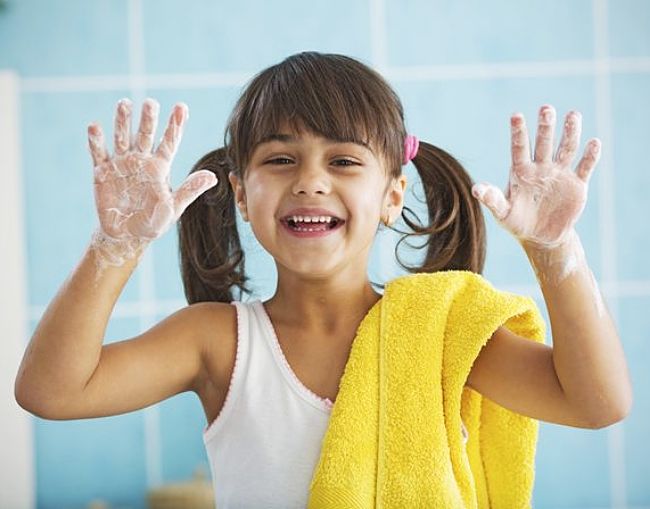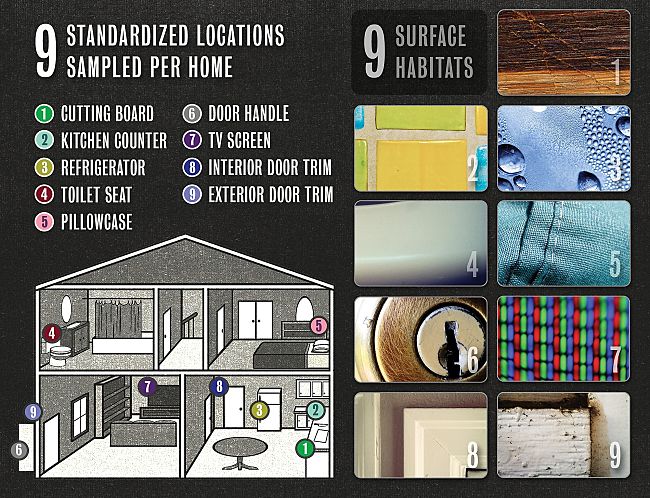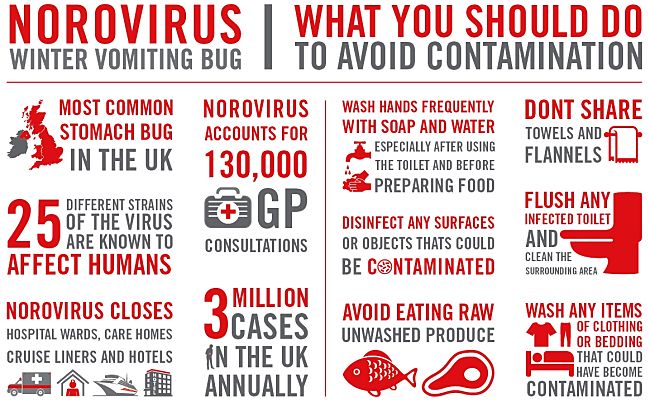Hand Washing, Hand Hygiene - Tips, Guides and Checks
It is an unwelcome shock to many that recent tests and surveys have found residues of fecal matter on more that 25% of people's hands in the UK at any one time.
Poor hand hygiene has been implicated as a major cause of infections in hospitals with up to 10% of patients getting an infection during their stay.
As long ago as the 1840s, Ignaz Semmelweis, showed the effectiveness of hand decontamination in reducing infection rates in hospitals.
Periodically whenever strict programs of hand decontamination are enforced in modern hospitals with alcohol based rubs, the rate of in-hospital infection falls but inevitably rises again as staff lapse back into old habits and improper practices.
Why are people so reluctant to wash their hands frequently and to decontaminate them properly, even in hospitals?
Hands contaminated from touching door handles, stair banisters and lift buttons has be shown to be a major cause of transmission of cold and flu infections.
The value of hand decontamination by frequent washing and the use of the new alcohol and other solvent based scrubs and gels has been shown to reduce the transmission of infection.
This article discusses the latest information on hand washing and hand hygiene and provides tips and advice on how to do it properly at home, in school and at the workplace.
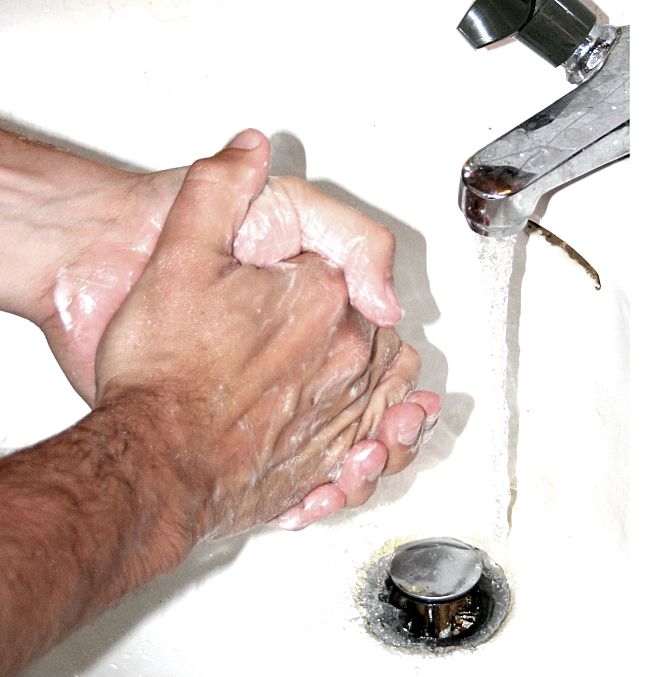
Severity of Hand Contamination and Things Touched with Hands
Recent surveys in the UK found fecal bacteria on 26% of hands, 10% of credit cards and 14% of banknotes.
About 11% of hands were classified as "grossly contaminated" and were contaminated with as many bacteria as a dirty toilet bowl. About 8% of credit cards and 6% of banknotes were seriously contaminated.
Fecal matter were also on about 15% mobile phones. A survey of 33 computer keyboards, swabbed and tested for bacteria in the UK found 4 that was regarded as a potential health hazard and one was so badly contaminated it had to be cleaned.
Your keyboard often mirrors the bacteria that are in your nose, mouth and gut. Sharing keyboards is not recommended.
A recent UK-wide study that checked whether people washed their hands after going to the toilet in service stations, showed that only 64% of women and 32% of men, actually washed their hands although 99% of the people said they had.
So why don't people wash their hands. It appears to be related to how people see ourselves. They simply don't recognised that their hands are dirty. Similarly people are unaware of the risks posed by dirty hands.
They also don't understanding the simplest hygiene needed and how to was hands properly and used alcohol scrubs to decontaminated them.
Research in the US has shown that an average person has more than 3,000 bacteria only their hands belonging to more than 100 species. Each person has their own unique "bacterial fingerprint", based on the bacteria in their nose and gut. Oddly there are often differences on your left and right hand. One study found only 13% of the bacteria were the same on the right and left hand.
Other studies have shown that while women wash their hands more often than men, women have a more diverse range of germs living on them.
This may be related to differences in hormones, sweat, and perhaps the use of makeup. Most bacteria found on hands are not pathogens and do not cause disease.
Hand hygiene is more about preventing infections from bad germs by touching contaminated surfaces and also about not passing on germs that are picked up by our hands.
Often bad hand hygiene is not due to laziness or a lack of awareness, but is more about not doing it often enough and properly. Good hand hygiene is about knowing what to do and when to do it.
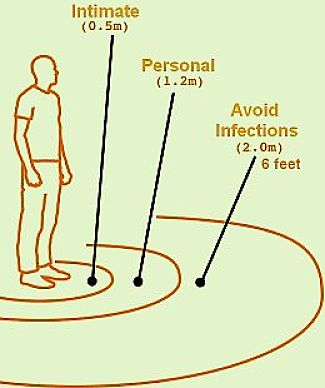
Are Alcohol Rubs Better for Decontaminating Hands that Washing your Hands?
There are many varieties of special alcohol based preparations, in the form of gels, solutions or foams. they are very effective and can be used on-the-run so to speak, without having to go to the bathroom. In many hospitals there are bottles of these rubs at the foot of every bed and dotted elsewhere around the wards. Hospital staff and visitors are encouraged to use them every time they tough a patient or a surface that could be contaminated. Staff generally do a thorough rub just before attending to each new patient.
The major advantages of alcohol based rubs, compared with washing hands in soap and water are:
- They cause less drying of the skin
- They kill many more germs and there is less chance of re-infection when people wash their hands and then touch door handles and various equipment
However, alcohol based preparations do not remove dirt and grime from your hands. If your hands are dirty, the alcohol rubs won't penetrate and won't be effective. So if your hands are dirty it is best to wash your hands with warm water and soap, dry them and perhaps follow-up with an alcohol based rub.
When is washing your hands with soap and water required?
- Adults and children should wash their hands:
- After going to the toilet
- After sneezing or blowing your nose
- After touching pets or other animals
- After changing infant or adult nappies
- After slicing or preparing raw meats like chicken or beef for cooking
- Before you start to prepare food items for meals
- Before you start eating your food
- After making contact with any body fluids such as urine, blood, sweat or vomit
- When your hands are visibly dirty and need washing to remove grime and dirt.
When should alcohol based hand rubs be used?
Adults and children should rub their hands with an alcohol rub:
- Whenever you need to decontaminate your hands before doing something which could lead to infections
- Before and after you help someone who is sick, or an older person, or young children and babies
- After you have come into direct or indirect contact with obviously contaminated things such as nappies, wound dressings, dirty tissues or even touched your own mouth, nose, eyes or bodies
- For routine cleaning of hands that are not dirty and so not need to be scrubbed with sap and water.
The proper techniques for washing hands with soap and water, and cleaning you hands with an alcohol rub are shown in the images below.
Guide to Washing Hands Properly
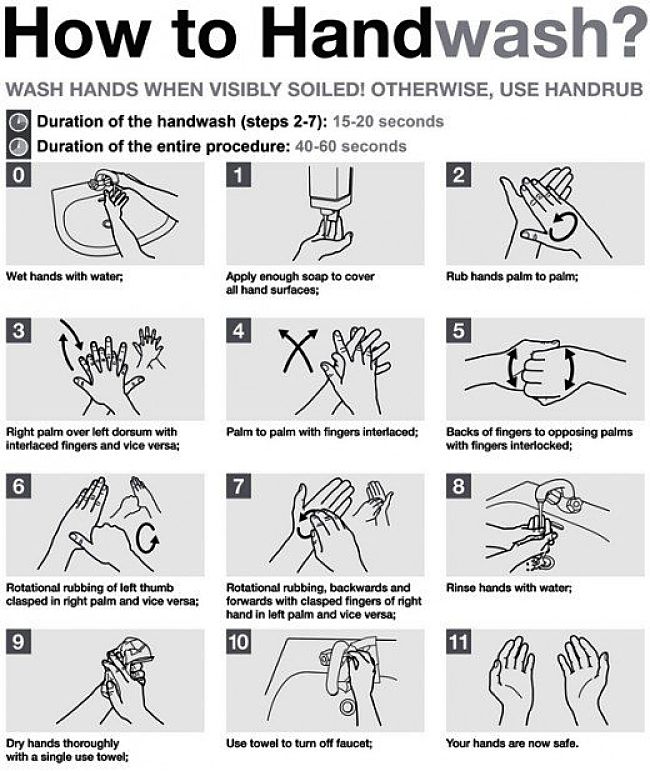
Guide to Using Hand Rubs for Hand Hygiene
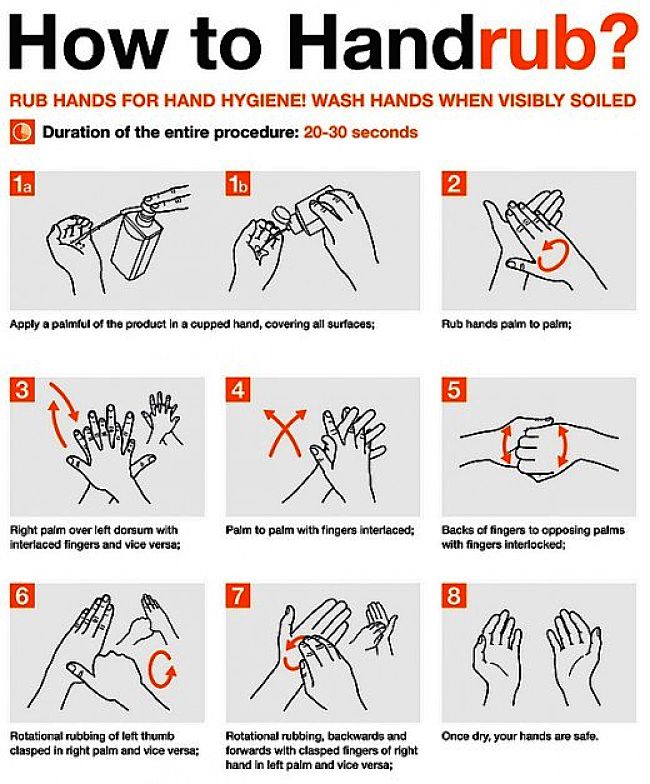
Related Articles
=> Beware of Contaminated Surfaces, Items, Appliances in Kitchen
=> Which Meats Have the Highest Contamination Risks for Food Poisoning?
=> Health Risks of Uncooked Chicken and Turkey - Contamination Common, Follow the No Wash Advice
=> Q&A How to Load Dishwasher Properly - Tips for the Correct Way to Stack Shelves, Baskets

